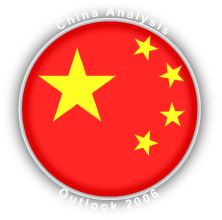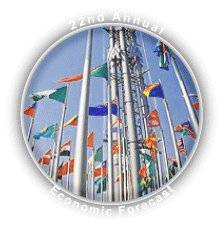High Potential for Business Innovation
 Plus ça change* was the theme of The Executives’ Club of Chicago High Technology Conference December eighth, where an esteemed panel gave varying perspectives on Chicago’s importance as a technology center. William Avery of Brunswick Corporation, James O’Connor, Jr. of Motorola, Inc. and Ira H. Cohen of Goldman, Sachs & Co. spoke about technology from enterprise IT, mobile technology and investment points of view respectively. Prior to their prepared remarks, John Gentry of CSC Consulting outlined key results of the forthcoming Chicago Technology Outlook Survey, in which corporate technology leaders commented on IT trends for 2007 as well as Chicago’s role as a technology center. He moderated the panel during a Q&A session. Plus ça change* was the theme of The Executives’ Club of Chicago High Technology Conference December eighth, where an esteemed panel gave varying perspectives on Chicago’s importance as a technology center. William Avery of Brunswick Corporation, James O’Connor, Jr. of Motorola, Inc. and Ira H. Cohen of Goldman, Sachs & Co. spoke about technology from enterprise IT, mobile technology and investment points of view respectively. Prior to their prepared remarks, John Gentry of CSC Consulting outlined key results of the forthcoming Chicago Technology Outlook Survey, in which corporate technology leaders commented on IT trends for 2007 as well as Chicago’s role as a technology center. He moderated the panel during a Q&A session.
The net-net: Chicago has a way to go before it becomes a preeminent technology center; however, its best chance for creating breakaway value through innovation will lie in not focusing on technology, as explained in Analysis and Conclusions.
[…]
The Knowledge Economy, Ultimate Context for Understanding the Future welcomes you to the Post-Industrial World, which turns past assumptions on their heads.
 The Knowledge Economy is a post-industrial economy characterized by a highly developed information technology industry along with overproduction and commoditization in industrial and agricultural sectors. Widespread information technology (IT) adoption among producers and consumers enables all market participants to create and share information about all aspects of economic transactions. The creation, packaging and sharing of information is termed “knowledge.” In the Knowledge Economy, information about an underlying good creates most of the good’s differentiated value. The Knowledge Economy is a post-industrial economy characterized by a highly developed information technology industry along with overproduction and commoditization in industrial and agricultural sectors. Widespread information technology (IT) adoption among producers and consumers enables all market participants to create and share information about all aspects of economic transactions. The creation, packaging and sharing of information is termed “knowledge.” In the Knowledge Economy, information about an underlying good creates most of the good’s differentiated value.
Consumer mobilization and engagement in the Knowledge Economy renders many of the Industrial Economy’s rules invalid. In the Industrial Economy, consumers had little information relative to producers, they were isolated from each other, and they had no collective voice. They were at a disadvantage as market participants. The “second stage” of the Internet, “Web 2.0,” facilitates P2P (peer to peer) information sharing, and its tools are free to use and accessible to anyone with an Internet connection. Producers […]
The TransAtlantic Partnership’s Implications for U.S., E.U. Economies summarizes coverage of the EEC International Conference—Talking with the Ambassadors of the World’s Largest Trading Relationship and the CEOs of Four Global Enterprises.
 Three eminent diplomatic leaders and CEOs from Baxter, Financial Dynamics, ITW and Philips briefed Midwest executives on the current status and future directions of the world’s largest trading relationship at the Executives’ Club of Chicago’s International Conference November 15. The half-day program featured several presentations, a CEO panel and a media round table. All speakers sought to impress upon the audience the pivotal importance of the transatlantic alliance for the United States and Europe, and most warned chief executives neither to take it for granted nor to be passive in the face of rising protectionism. Three eminent diplomatic leaders and CEOs from Baxter, Financial Dynamics, ITW and Philips briefed Midwest executives on the current status and future directions of the world’s largest trading relationship at the Executives’ Club of Chicago’s International Conference November 15. The half-day program featured several presentations, a CEO panel and a media round table. All speakers sought to impress upon the audience the pivotal importance of the transatlantic alliance for the United States and Europe, and most warned chief executives neither to take it for granted nor to be passive in the face of rising protectionism.
The fact that the importance of the E.U.—U.S. alliance had to be emphasized brought into sharp relief the relatively sudden rise of Asia as well as the shift from the Industrial Economy to the Knowledge Economy. Both megatrends pose opportunities and threats for the world’s largest economies and enterprises, and […]
The Silver Lining in India’s Infrastructure Gap posits that India’s poor infrastructure face force it to develop more lucrative Knowledge Economy assets.
India is often described as a mixed proposition with respect to its future promise. Although few would question its brilliance as a “burgeoning technology economy,” most people temper this with somber remarks about its lack of “infrastructure.” However, I will argue that India’s limitations with physical infrastructure will actually help India get further ahead than if it didn’t have such problems.
In the popular view (see Indian Raj and its quote of The Houston Chronicle), India’s technology expertise, language skills and legal sensibilities are its trump cards, but this is compromised by its lack of roads, transportation of all kinds, network infrastructure, electricity, and so on. High tech companies have to build their own generators and network infrastructure, and leading providers have created islands of world class capability to assure their global clients that they don’t depend on the country’s infrastructure. China, on the other hand, is generally seen as a paragon of world-class infrastructure, especially physical infrastructure. Woe is India.
[…]
Jim Champy, author of many management bestsellers, including Reengineering the Corporation, led a fascinating discussion 18 April 2006 at Chicago’s Standard Club, sponsored by Perot Systems. Beginning with the presentation, “Doing Business in a Flat World: An Exploration of the Next Era in Globalization,” Jim gave attendees an invaluable perspective on how executives needed to reengineer reengineering for the knowledge economy. He highlighted past transformational efforts in the industrial economy (the original reengineering) and focused on how to achieve change in the knowledge economy. As usual, I will summarize key points of the discussion first and follow up with my insights.
Reengineering: 20th Century
In the 80s and 90s, reengineering helped businesses improve their business processes. For example, an insurance company regularly required 24 days to issue a policy because 13 departments were involved, each of which had optimized processes for itself, not the enterprise (or the customer). In fact, to issue the policy took ten minutes of actual work; the rest was administrative time. Today, business models of the industrial era are becoming obsolete, but most companies haven’t yet changed how they manage their businesses. A default method of drastic organization change, often employed by IBM and many others, […]
China Analysis and Outlook 2006 reveals an emerging opportunity to rebalance economic and political influence.
 Part II of the 2006 Economic Forecast featuring David Hale (presented Part I) and Lyric Hughes-Hale. Here, I present my notes of Lyric’s talk, followed by my observations. Part II of the 2006 Economic Forecast featuring David Hale (presented Part I) and Lyric Hughes-Hale. Here, I present my notes of Lyric’s talk, followed by my observations.
Background: China’s development and situation are far more complex than U.S. news sources report. It has seen significant economic liberalization during the past 25 years, and it shows every sign of continuing on that trajectory. However, the country is politically conservative. There is no freedom of the press. That said, the authoritarian government may produce reform much more quickly than if China had been democratic because the democratic process often slows reform. China is far more open and engaged on the world stage than it has been in many years. […]

SMA 21st Annual Economic Forecast 2006 is my coverage of the SMA/Harvard Club annual confab featuring David Hale and Lyric Hughes-Hale
The Strategic Management Association and The Harvard Club jointly sponsored the Economic Forecast 2006 featuring David Hale and Lyric Hughes-Hale. David presented his encyclopedic knowledge and perspective on global economic trends, while Lyric shared her insights on China in Part II of the evening (she was the founder of China Online and has focused on China for several years.).
As usual, I present my notes, followed by my insights. Here are my notes from David’s presentation (Part I of the meeting).
[…]
Last night I attended TiE Chicago’s “The Great Chicago Tech Debate,” which turned out to be a rousing panel discussion (no, that’s not necessarily an oxymoron 😉 replete with insights. As it was my first TiE (The Indus Entrepreneur) event, I enjoyed taking an informal survey of members afterwards, and everyone I spoke with found it extremely valuable (not awfully surprising, but still..). TiE, which was founded in The Valley and has chapters globally, is a network to support entrepreneurs. As its name suggests, many of its leaders originally hail from India, and many have founded, led or helped to launch successful start-ups that have leveraged offshore partners in India.
Although the setting of this tale is Chicago, its lessons will apply to many other cities, provinces or countries that find themselves in a global knowledge economy, with the need to form a vision to galvanize their citizens to make changes in order to succeed in the new environment. Two of the main challenges are: making the shift from the industrial economy to the knowledge economy and the need to differentiate to compete. “Technology” plays a supporting role, which we’ll discuss more in a minute. After some observations on the […]
Sidebar: Industrial Economy DNA
Chicago, in being one of the foremost industrial regions, has industrial economy DNA. This DNA isn’t well suited to the first phase of the knowledge economy, which turns many industrial economy assumptions on their heads. For example, even more remarkable than tech companies’ ability to create wealth quickly is their lack of constraints from raw material inputs: these companies can be located anywhere, irrespective of natural resources. Their main physical requirements are power and fiber, which can be built or brought almost anywhere. In contrast, putting together an industrial enterprise involves accommodating materials with physical constraints at every turn: the sources of raw material inputs are often limited and scarce. Moving the material or parts from one area of the enterprise to another often requires special machines and specialized equipment. Dangerous chemicals are often involved in transforming raw materials. Disposing of waste is not trivial. Often, machinery to transform the raw materials must be custom built, and the machinery imposes its own constraints. Consequently, Chicagoans are accustomed to changes being incremental; we are accustomed to things taking time. This economy is bits, not bytes.
Chicago is renowned as a distribution hub, which began with its proximity […]
The End of Corporate Imperialism, by C.K. Prahalad and Kenneth Lieberthal, encapsulates the obvious elegantly and factually, and its thesis is far more true today than in 1998, when it was written: “Too often, companies try to impose Western models of commerce on developing countries. They’d do better—and learn more—if they tailored their operations to the unique conditions of emerging markets.” Western MNCs (multinational corporations) perceive the primitive state of consumption in emerging markets, and they too often develop a strategy in which they: 1) focus on the extreme minority of wealthy consumers and/or 2) address the order of magnitude larger middle tier of the market by offering their past-mature products with minor cosmetic changes.
This is another symptom of MNCs’ being stuck between industrial and knowledge economies. As I stated in my Transourcing Point of View, “Enterprises are ambivalent about innovation and product creation because they represent an inherent conflict: the drive to amortize past investments (including process-oriented constraints of marketing, distribution, service, etc.) conflicts with companies’ need to satisfy customers’ wishes for novelty. In practice, this too often leads to vapid product extensions.” The industrial-era enterprise derived its competitiveness largely through production and distribution efficiency, and it marketed […]
|
|
 Plus ça change* was the theme of The Executives’ Club of Chicago High Technology Conference December eighth, where an esteemed panel gave varying perspectives on Chicago’s importance as a technology center. William Avery of Brunswick Corporation, James O’Connor, Jr. of Motorola, Inc. and Ira H. Cohen of Goldman, Sachs & Co. spoke about technology from enterprise IT, mobile technology and investment points of view respectively. Prior to their prepared remarks, John Gentry of CSC Consulting outlined key results of the forthcoming Chicago Technology Outlook Survey, in which corporate technology leaders commented on IT trends for 2007 as well as Chicago’s role as a technology center. He moderated the panel during a Q&A session.
Plus ça change* was the theme of The Executives’ Club of Chicago High Technology Conference December eighth, where an esteemed panel gave varying perspectives on Chicago’s importance as a technology center. William Avery of Brunswick Corporation, James O’Connor, Jr. of Motorola, Inc. and Ira H. Cohen of Goldman, Sachs & Co. spoke about technology from enterprise IT, mobile technology and investment points of view respectively. Prior to their prepared remarks, John Gentry of CSC Consulting outlined key results of the forthcoming Chicago Technology Outlook Survey, in which corporate technology leaders commented on IT trends for 2007 as well as Chicago’s role as a technology center. He moderated the panel during a Q&A session.
 The Knowledge Economy is a post-industrial economy characterized by a highly developed information technology industry along with overproduction and commoditization in industrial and agricultural sectors. Widespread information technology (IT) adoption among producers and consumers enables all market participants to create and share information about all aspects of economic transactions. The creation, packaging and sharing of information is termed “knowledge.” In the Knowledge Economy, information about an underlying good creates most of the good’s differentiated value.
The Knowledge Economy is a post-industrial economy characterized by a highly developed information technology industry along with overproduction and commoditization in industrial and agricultural sectors. Widespread information technology (IT) adoption among producers and consumers enables all market participants to create and share information about all aspects of economic transactions. The creation, packaging and sharing of information is termed “knowledge.” In the Knowledge Economy, information about an underlying good creates most of the good’s differentiated value. Three eminent diplomatic leaders and CEOs from Baxter, Financial Dynamics, ITW and Philips briefed Midwest executives on the current status and future directions of the world’s largest trading relationship at the Executives’ Club of Chicago’s International Conference November 15. The half-day program featured several presentations, a CEO panel and a media round table. All speakers sought to impress upon the audience the pivotal importance of the transatlantic alliance for the United States and Europe, and most warned chief executives neither to take it for granted nor to be passive in the face of rising protectionism.
Three eminent diplomatic leaders and CEOs from Baxter, Financial Dynamics, ITW and Philips briefed Midwest executives on the current status and future directions of the world’s largest trading relationship at the Executives’ Club of Chicago’s International Conference November 15. The half-day program featured several presentations, a CEO panel and a media round table. All speakers sought to impress upon the audience the pivotal importance of the transatlantic alliance for the United States and Europe, and most warned chief executives neither to take it for granted nor to be passive in the face of rising protectionism. Part II of the 2006 Economic Forecast featuring David Hale (presented Part I) and Lyric Hughes-Hale. Here, I present my notes of Lyric’s talk, followed by my observations.
Part II of the 2006 Economic Forecast featuring David Hale (presented Part I) and Lyric Hughes-Hale. Here, I present my notes of Lyric’s talk, followed by my observations.